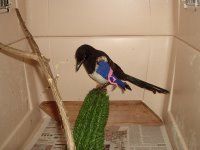 Small birds get injured also. Bird TLC is not just about raptors. We take in all wild birds. Bird Treatment and Learning Center. There are certain things you have to watch out for when your capturing small birds compared to large ones.
Small birds get injured also. Bird TLC is not just about raptors. We take in all wild birds. Bird Treatment and Learning Center. There are certain things you have to watch out for when your capturing small birds compared to large ones.Most small birds don't hurt when they bite unless they pinch you in the right spot. Their beaks are not designed to rip and tear. They are for eating berries or small insects.
Their feet are designed to grab branches, not a running bunny or swimming salmon. They aren't going to be able to poke you or talon you like an eagle.
I use a towel most of the time when I capture a small bird. It just makes it quick and easy compared to bare hands. It also reduces stress when their heads are covered after capture.
You have to be careful not to hold them too tight. It's easily done and you can do some major damage. It's OK if you don't hold them tight enough and they get away. You can just recapture them. You don't have to be as concerned with your own safety like you do with raptors.

After capture, put them in a small box, pet carrier or a grocery bag and secure it closed. Make sure they get plenty of air. Remember, they are small and fragile. Carry the box or bag like they are small and fragile. Take them straight to a rehab clinic.
If you take a bird to a wildlife rehabilitator, you can help by taking a donation of food, money, or volunteer your time and talents. Keep in mind that most organizations rely solely on donations from caring people like you. Your thoughtfulness will be greatly appreciated.
As with handling all birds, wash your hands when you are done.
Do not attempt to raise or keep wildlife yourself. Not only is it illegal, but wild creatures do not make good pets and captivity poses a constant stress to them. Young wild animals raised without contact with their own species fail to develop survival skills and fear of humans, virtually eliminating their chances of survival in the wild.
5 comments:
I saw an injured yellow-billed cuckoo on one bird walk in the fall, but I wasn't sure what to do with it so I left it. I don't really know what the proper agencies are around here.
Dave-- Thank you so much. This has been so helpful. I think I'll put a towel and a box in the trunk of the car. It could be useful for so many things, but saving the life of a bird would be the best.
Thanks again.
Check out this link John. http://www.tc.umn.edu/%7Edevo0028/contact.htm It list all the rahabbers in the U.S. No, there's not any listed for DC, but there are many listed in Maryland and Virginia. You can also contact the local U.S. Fish & Wildlife office or DC Animal Control.
Daughter, I carry an old army blanket, a bath towel, extra winter clothes, a leatherman, flashlight, paper towels, waterless hand cleaner, my camera and a field guide in my truck. During summer I also have waders. I'm going to invest in a collapsable kennel, the airline type take up way too much room.
I like your list! I put the box and bath towel in the trunk already, and I think I'll add paper towels and waterless hand cleaner. It's good going out into the world prepared.
My wife Ruthie read this and commented "Yeah, when you put the waders in you also put the fly rod and tackel box in also". I wonder what she meant by that?
Post a Comment